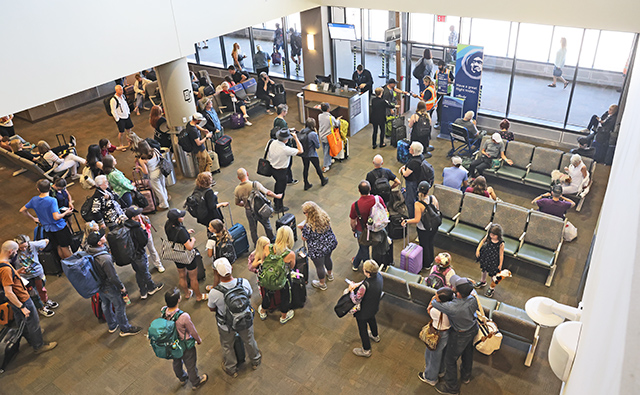John Cullen, coast guardsman who detected spies, 90
Published 5:00 am Saturday, September 3, 2011
In spring 1942, Seaman John Cullen was assigned to one of the Coast Guard’s less glamorous tasks in an America newly at war.
Cullen was a “sand pounder,” the term for Coast Guardsmen who patrolled beaches looking for signs of lurking German submarines or perhaps someone or something suspicious on the sand.
“Once in a while you might run into somebody, but very rare,” Cullen, who died Monday, told a Coast Guard oral history interviewer in 2006, recalling his patrols on the eastern Long Island shore near his station at Amagansett.
On Friday the 13th of June ‘42, Cullen was on patrol about a half-hour past midnight when it was “so foggy that I couldn’t see my shoes.”
He spotted a figure in the mist and the outlines of three others behind him. “Who are you?” he called out, shining his flashlight at the group, his Coast Guard insignia visible.
The man closest to him said that he and his companions were fishermen who had run aground. He spoke English well enough, but one of the others, dragging a bag, shouted something in German.
Cullen was “armed” only with a flare gun for sending signals when he came across what he figured were surely German spies. Moments later, he fled from the men and ran back to his station to sound an alarm. He led fellow Coast Guardsmen to the spot where he had encountered the four. They were long gone, but the Coast Guard dug up explosives they had buried.
Thus began a hunt for saboteurs who had been sent to the United States on U-boats by the German military spy service in a plot to blow up rail facilities and war-industry plants.
Eight men — the four who landed on Long Island and another four who arrived in Florida — were arrested before any sabotage could be carried out, and Cullen became a hero.
Cullen, who was 90, died of congestive heart failure in Chesapeake, Va., his daughter, Jean McLaughlin, said. He had retired there with his wife, Alice, in the early 1990s after working as a dairy company sales representative on Long Island and living there in Westbury.
John Cornelius Cullen was born on Oct. 2, 1920, in Manhattan, but grew up in Queens. He enlisted in the Coast Guard a few weeks after the Japanese attack on Pearl Harbor.
A few minutes after he discovered the supposed fishermen on that foggy night in June ‘42, the leader of the group, dropping all pretence, asked Cullen if he had a mother and father who would grieve for him. The man did not display a weapon but said, “I wouldn’t want to have to kill you.”
But then the tone changed. The man offered Cullen what he said was $300 in U.S. money, saying, “Why don’t you forget the whole thing?” Seeing a chance to escape, Cullen took the money, promised he would never identify the men and ran back to get help. (He then found he was shortchanged; he had been given $260.)
The four German agents, minus their explosives, took the Long Island Rail Road into Manhattan that morning, arriving at Pennsylvania Station. A week later, the group’s leader, George Dasch, shaken by his encounter with Cullen, traveled to Washington and surrendered to the FBI, hoping he would be regarded as a hero by exposing the plot. That led to the roundup of his so-conspirators in Operation Pastorius, named for Franz Pastorius, who in 1683 led the first German settlement in America.
At a secret military trial in Washington, Cullen identified Dasch as the man he had encountered on the beach. Six of the eight saboteurs were executed on Aug. 8, 1942. Dasch and another conspirator who cooperated were given prison terms and deported to West Germany after World War II.
Cullen became enveloped in the Coast Guard’s publicity machine. He was brought to news conferences to tell of his adventure and appeared at parades, ship launchings and war-bond drives.






